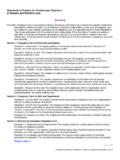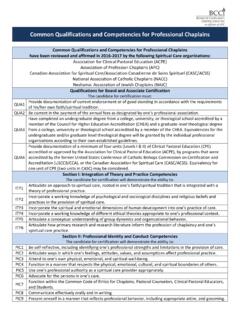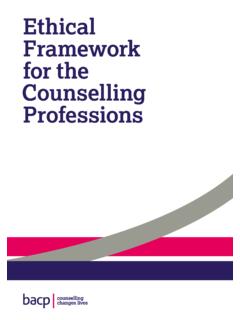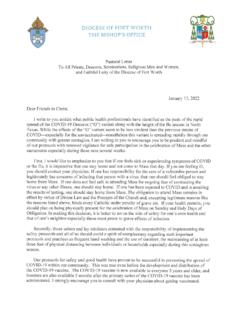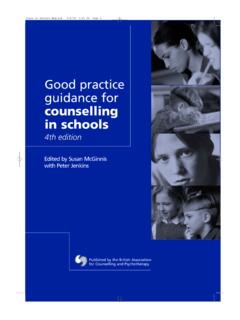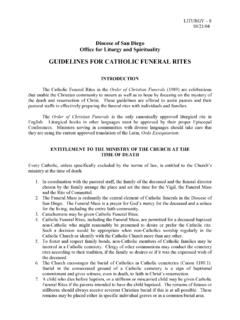Transcription of Common Code of Ethics for Chaplains, Pastoral Counselors ...
1 This document is one of four foundational documents affirmed by the constituent boards of the Council on Collaboration on November 7, 2004 in Portland, Maine. Collectively, these documents establish a unified voice for the six organizations that have affirmed them and describe what it means to these organizations to be a professional Pastoral care provider, Pastoral counselor or educator. The four documents are: Common Standards for Professional Chaplaincy Common Standards for Pastoral Educators/Supervisors Common Code of Ethics for Chaplains, Pastoral Counselors , Pastoral Educators and Students Principles for Processing Ethical Complaints The membership of the participating groups represents over 10,000 members who currently serve as chaplains, Pastoral Counselors , and clinical Pastoral educators in specialized settings as varied as healthcare, counseling centers, prisons or the military.
2 The complete documents and information about each of the collaborating groups can be found on the following Web sites: Association of Professional Chaplains (APC) - American Association of Pastoral Counselors (AAPC) - Association for Clinical Pastoral Education (ACPE) - National Association of Catholic Chaplains (NACC) - National Association of Jewish Chaplains (NAJC) - Canadian Association for Spiritual care (CASC) - For more information on the foundations of professional Pastoral care see Professional Chaplaincy: Its Role and Importance in Healthcare available at Common Code of Ethics for Chaplains, Pastoral Counselors , Pastoral Educators and Students hereinafter referred to as: Spiritual care Professionals The Code of Ethics for Spiritual care Professionals: gives expression to the basic values and standards of the profession; guides decision making and professional behavior; provides a mechanism for professional accountability; and informs the public as to what they should expect from Spiritual care Professionals.
3 Preamble Spiritual care Professionals are grounded in communities of faith and informed by professional education and training. They are called to nurture their personal health of mind, body and spirit and be responsible for their personal and professional conduct as they grow in their respect for all living beings and the natural environment. When Spiritual care Professionals behave in a manner congruent with the values of this code of Ethics , they bring greater justice, compassion and healing to our world. Spiritual care Professionals: affirm the dignity and value of each individual; respect the right of each faith group to hold to its values and traditions; advocate for professional accountability that protects the public and advances the profession; and respect the cultural, ethnic, gender, racial, sexual-orientation, and religious diversity of other professionals and those served and strive to eliminate discrimination.
4 Ethical Principles in Relationships with Clients Spiritual care Professionals understand clients to be any counselees, patients, family members, students or staff to whom they provide spiritual care . In relationships with clients, Spiritual care Professionals uphold the following standards of professional Ethics . Spiritual care Professionals: Speak and act in ways that honor the dignity and value of every individual. Provide care that is intended to promote the best interest of the client and to foster strength, integrity and healing. Demonstrate respect for the cultural and religious values of those they serve and refrain from imposing their our own values and beliefs on those served.
5 Are mindful of the imbalance of power in the professional/client relationship and refrain from exploitation of that imbalance. Maintain relationships with clients on a professional basis only. Avoid or correct any conflicts of interest or appearance of conflicting interest(s). Refrain from any form of sexual misconduct, sexual harassment or sexual assault in relationships with clients. Refrain from any form of harassment, coercion, intimidation or otherwise abusive words or actions in relationships with clients. Safeguard the confidentiality of clients when using materials for educational purposes or written publication.
6 Respect the confidentiality of information entrusted to them by clients when communicating with family members or significant others except when disclosure is required for necessary treatment, granted by client permission, for the safety of any person or when required by law. Understand the limits of their individual expertise and make referrals to other professionals when appropriate. Ethical Principles in Relationships Between Supervisors/Educators and Students Spiritual care Professionals respect the integrity of students using the power they have as supervisors/educators in responsible ways.
7 Spiritual care Professionals: Maintain a healthy educational environment free of coercion or intimidation. Maintain clear boundaries in the areas of self-disclosure, intimacy and sexuality. Provide clear expectations regarding responsibilities, work schedules, fees and payments. Provide adequate, timely and constructive feedback to students. Maintain a healthy respect for the personal growth of students and provide appropriate professional referrals. Maintain appropriate confidentiality regarding all information and knowledge gained in the course of supervision.
8 Ethical Principles in Relationships with Faith Community Spiritual care Professionals are accountable to their faith communities, one another and other organizations. Spiritual care Professionals: Maintain good standing in their faith group. Abide by the professional practice and/or teaching standards of the state/province, the community and the institution in which they are employed. If for any reason a Spiritual care Professional is not free to practice or teach according to conscience, the Spiritual care Professional shall notify the employer, his or her professional organization and faith group as appropriate.
9 Do not directly or by implication claim professional qualifications that exceed actual qualifications or misrepresent an affiliation with any institution. Ethical Principles in Relationships with Other Professionals and the Community Spiritual care Professionals are accountable to the public, faith communities, employers and professionals in all professional relationships. Spiritual care Professionals: Promote justice in relationships with others, in their institutions and in society. Represent accurately their professional qualifications and affiliations. Exercise good stewardship of resources entrusted to their care and employ sound financial practices .
10 Respect the opinions, beliefs and professional endeavors of colleagues and other professionals. Seek advice and counsel of other professionals whenever it is in the best interest of those being served and make referrals when appropriate. Provide expertise and counsel to other health professionals in advocating for best practices in care . Seek to establish collaborative relationships with other community and health professionals. Advocate for changes in their institutions that would honor spiritual values and promote healing.

